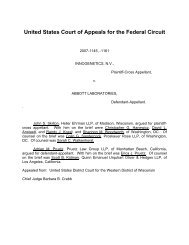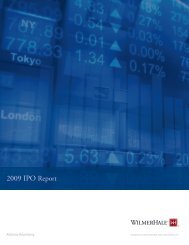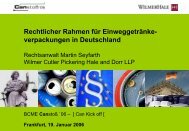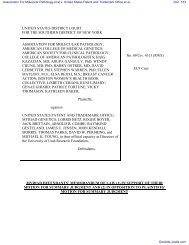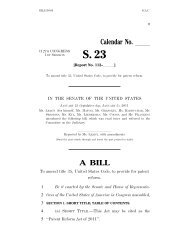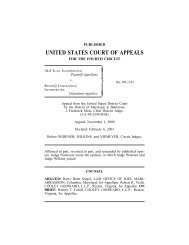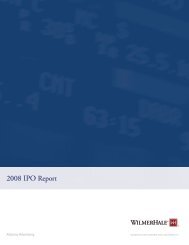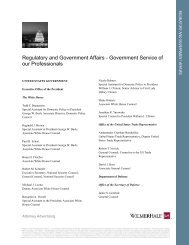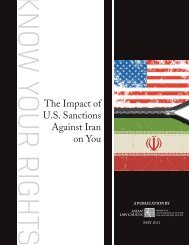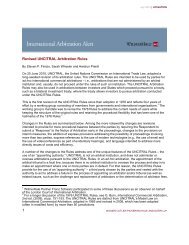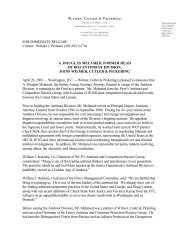Meeting the Challenge: Efficiency and Flexibility in ... - WilmerHale
Meeting the Challenge: Efficiency and Flexibility in ... - WilmerHale
Meeting the Challenge: Efficiency and Flexibility in ... - WilmerHale
Create successful ePaper yourself
Turn your PDF publications into a flip-book with our unique Google optimized e-Paper software.
The International Comparative Legal Guide to:<br />
International Arbitration 2011<br />
A practical cross-border <strong>in</strong>sight<br />
<strong>in</strong>to <strong>in</strong>ternational arbitration work<br />
Published by Global Legal Group, <strong>in</strong> association with CDR,<br />
with contributions from:<br />
Abreu Advogados<br />
Aivar Pilv Law Office<br />
Anderson Mori & Tomotsune<br />
Borden Ladner Gervais LLP<br />
Boss & Young<br />
Bred<strong>in</strong> Prat<br />
Clayton Utz<br />
Clifford Chance CIS Limited<br />
CMS Cameron McKenna<br />
Cuatrecasas, Gonçalves Pereira<br />
De Brauw Blackstone Westbroek<br />
DLA Piper<br />
Dr. Col<strong>in</strong> Ong Legal Services<br />
Ebrahim Hosa<strong>in</strong><br />
Elv<strong>in</strong>ger, Hoss & Prussen<br />
Frank Advokatbyrå AB<br />
FTI Consult<strong>in</strong>g<br />
GESSEL Attorneys at law<br />
Habib Al Mulla & Co<br />
Hogan Lovells Lee & Lee<br />
Homburger<br />
JAMS<br />
Jiménez Cruz Peña<br />
K&L Gates LLP<br />
Kachwaha & Partners<br />
Karanovic & Nikolic<br />
Konrad & Justich<br />
Macleod Dixon<br />
Ma<strong>the</strong>son Ormsby Prentice<br />
Motieka & Audzevicius<br />
Oscós Abogados<br />
PUNUKA Attorneys & Solicitors<br />
Ritter + Wohlwend Rechtsanwälte AG<br />
Shalakany Law Office<br />
Sherby & Co., Advs.<br />
Sidley Aust<strong>in</strong> LLP<br />
Soewito Suhardiman Eddymurthy Kardono (SSEK)<br />
SKRINE<br />
Tilleke & Gibb<strong>in</strong>s<br />
Tonucci & Partners<br />
Vouga & Olmedo Abogados<br />
Werksmans Attorneys<br />
Wilmer Cutler Picker<strong>in</strong>g Hale <strong>and</strong> Dorr LLP
The International Comparative Legal Guide to: International Arbitration 2011<br />
Preface:<br />
1 Preface by Gary Born, Head of International Arbitration Group, Wilmer Cutler Picker<strong>in</strong>g Hale <strong>and</strong> Dorr LLP<br />
General Chapters:<br />
Contribut<strong>in</strong>g Editors<br />
Steven F<strong>in</strong>izio <strong>and</strong><br />
Wendy Miles, Wilmer<br />
Cutler Picker<strong>in</strong>g Hale <strong>and</strong><br />
Dorr LLP<br />
Account Managers<br />
Monica Fuertes, Dror<br />
Levy, Florjan Osmani,<br />
Oliver Smith, Rory Smith,<br />
Toni Wyatt<br />
Market<strong>in</strong>g Manager<br />
George Archer<br />
Sub Editors<br />
Suzie Kidd<br />
Jodie Mabl<strong>in</strong><br />
Senior Editor<br />
Penny Smale<br />
Manag<strong>in</strong>g Editor<br />
Alan Falach<br />
Publisher<br />
Richard Firth<br />
Published by<br />
Global Legal Group Ltd.<br />
59 Tanner Street<br />
London SE1 3PL, UK<br />
Tel: +44 20 7367 0720<br />
Fax: +44 20 7407 5255<br />
Email: <strong>in</strong>fo@glgroup.co.uk<br />
URL: www.glgroup.co.uk<br />
GLG Cover Design<br />
F&F Studio Design<br />
GLG Cover Image Source<br />
F&F Studio Design<br />
Pr<strong>in</strong>ted by<br />
Ashford Colour Press Ltd<br />
July 2011<br />
Copyright © 2011<br />
Global Legal Group Ltd.<br />
All rights reserved<br />
No photocopy<strong>in</strong>g<br />
ISBN 978-1-908070-04-3<br />
ISSN 1741-4970<br />
1 <strong>Meet<strong>in</strong>g</strong> <strong>the</strong> <strong>Challenge</strong>: <strong>Efficiency</strong> <strong>and</strong> <strong>Flexibility</strong> <strong>in</strong> International Commercial Arbitration -<br />
Kate Davies, Wilmer Cutler Picker<strong>in</strong>g Hale <strong>and</strong> Dorr LLP 1<br />
2 The Search for Cost Effective <strong>and</strong> Efficient International Commercial Arbitration: There is a Solution -<br />
Richard Chernick & Robert B. Davidson, JAMS 8<br />
3 Participation of Third Parties <strong>in</strong> International Arbitration: Th<strong>in</strong>k<strong>in</strong>g Outside <strong>the</strong> Box -<br />
Marc S. Palay & Tanya L<strong>and</strong>on, Sidley Aust<strong>in</strong> LLP 14<br />
4 The Recent Global Economic Environment: Impact on Damages <strong>and</strong> Valuation <strong>in</strong> International<br />
Arbitration - Sharon Moore & Greig Taylor, FTI Consult<strong>in</strong>g 19<br />
Asia Pacific:<br />
5 Overview Dr. Col<strong>in</strong> Ong Legal Services: Dr. Col<strong>in</strong> Ong 25<br />
6 Australia Clayton Utz: Doug Jones & Björn Gehle 33<br />
7 Brunei Dr. Col<strong>in</strong> Ong Legal Services: Dr. Col<strong>in</strong> Ong 43<br />
8 Ch<strong>in</strong>a Boss & Young: Xu Guojian & M<strong>in</strong>gjie Zhang 51<br />
9 Hong Kong Clayton Utz <strong>in</strong> association with Haley & Co: Glenn Haley & Patrick Daley 61<br />
10 India Kachwaha & Partners: Sumeet Kachwaha & Dharmendra Rautray 73<br />
11 Indonesia Soewito Suhardiman Eddymurthy Kardono (SSEK): Michael Carl & Dewi Savitri Reni 82<br />
12 Japan Anderson Mori & Tomotsune: Yoshimasa Furuta & Kiyoko Yagami 95<br />
13 Malaysia SKRINE: Ashok Kumar Mahadev Ranai & Lubna Sheikh Ghazali 103<br />
14 Pakistan Ebrahim Hosa<strong>in</strong>: Zahid F. Ebrahim & Shabnam Noorali 114<br />
15 S<strong>in</strong>gapore Hogan Lovells Lee & Lee: Paul Teo & Jonathan Leach 122<br />
16 Vietnam Tilleke & Gibb<strong>in</strong>s: Michael Lee & Doan Ngoc Tran 130<br />
Central <strong>and</strong> Eastern Europe:<br />
17 Albania Tonucci & Partners: Neritan Kallfa & Majl<strong>in</strong>da Sulstarova 138<br />
18 Estonia Aivar Pilv Law Office: Pirkka-Marja Põldvere & Ilmar-Erik Aavakivi 146<br />
19 Hungary CMS Cameron McKenna: Dr Zsolt Okányi LL.M. (Yale) & Dr Gergely László 153<br />
20 Lithuania Motieka & Audzevicius: Ramūnas Audzevičius & Mantas Juozaitis 162<br />
21 Macedonia Karanovic & Nikolic: Veton Qoku 170<br />
22 Pol<strong>and</strong> GESSEL Attorneys at law: Dr. Beata Gessel-Kal<strong>in</strong>owska vel Kalisz &<br />
Małgorzata Badowska 177<br />
23 Romania CMS Cameron McKenna: Gabriel Sidere & Flor<strong>in</strong> Dutu 185<br />
24 Russia Clifford Chance CIS Limited: Timur Aitkulov & Roman Khodyk<strong>in</strong> 194<br />
Western Europe:<br />
25 Overview Bred<strong>in</strong> Prat: Tim Portwood 205<br />
26 Austria Konrad & Justich: Christian W. Konrad & Philipp A. Peters 209<br />
27 Belgium DLA Piper: Carol<strong>in</strong>e Verbruggen & Jean-Michel Detry 217<br />
28 Engl<strong>and</strong> & Wales Wilmer Cutler Picker<strong>in</strong>g Hale <strong>and</strong> Dorr LLP: Wendy Miles & Kate Davies 226<br />
29 France Bred<strong>in</strong> Prat: Tim Portwood 241<br />
30 Germany DLA Piper: Dr. Frank Roth & Dr. Daniel H. Sharma 250<br />
31 Irel<strong>and</strong> Ma<strong>the</strong>son Ormsby Prentice: Nicola Dunleavy & Gearóid Carey 258<br />
32 Liechtenste<strong>in</strong> Ritter + Wohlwend Rechtsanwälte AG: Dr.iur. Ursula Wachter<br />
& Mag.iur. Samuel P. Ritter 267<br />
Cont<strong>in</strong>ued Overleaf<br />
Fur<strong>the</strong>r copies of this book <strong>and</strong> o<strong>the</strong>rs <strong>in</strong> <strong>the</strong> series can be ordered from <strong>the</strong> publisher. Please call +44 20 7367 0720<br />
Disclaimer<br />
This publication is for general <strong>in</strong>formation purposes only. It does not purport to provide comprehensive full legal or o<strong>the</strong>r advice. Global Legal Group Ltd. <strong>and</strong> <strong>the</strong><br />
contributors accept no responsibility for losses that may arise from reliance upon <strong>in</strong>formation conta<strong>in</strong>ed <strong>in</strong> this publication. This publication is <strong>in</strong>tended to give an<br />
<strong>in</strong>dication of legal issues upon which you may need advice. Full legal advice should be taken from a qualified professional when deal<strong>in</strong>g with specific situations.<br />
www.ICLG.co.uk
The International Comparative Legal Guide to: International Arbitration 2011<br />
33 Luxembourg Elv<strong>in</strong>ger, Hoss & Prussen: Yves Prussen & Marc Elv<strong>in</strong>ger 274<br />
34 Ne<strong>the</strong>rl<strong>and</strong>s De Brauw Blackstone Westbroek: Eelco Meerd<strong>in</strong>k & Edward van Geuns 283<br />
35 Portugal Abreu Advogados: José Maria Corrêa de Sampaio & Pedro Sousa Uva 291<br />
36 Spa<strong>in</strong> Cuatrecasas, Gonçalves Pereira: Cristian Conejero Roos & Iñigo Qu<strong>in</strong>tana Aguirre 302<br />
37 Sweden Frank Advokatbyrå AB: Hans Bagner & Kristoffer Persson 310<br />
38 Switzerl<strong>and</strong> Homburger: Felix Dasser & Balz Gross 318<br />
Lat<strong>in</strong> America:<br />
39 Overview DLA Piper: Pedro J. Mart<strong>in</strong>ez-Fraga & Harout Jack Samra 327<br />
40 Dom<strong>in</strong>ican Republic Jiménez Cruz Peña: Marcos Peña Rodríguez & Laura Med<strong>in</strong>a Acosta 333<br />
41 Mexico Oscós Abogados: Dario U. Oscos C & Dario A. Oscos R 341<br />
42 Paraguay Vouga & Olmedo Abogados: Rodolfo Vouga Müller & Rodolfo G. Vouga Zuccolillo 350<br />
43 Venezuela Macleod Dixon: Ramón J. Alv<strong>in</strong>s Santi & Pedro J. Saghy C. 357<br />
Middle East / Africa:<br />
44 Overview Habib Al Mulla & Co.: Gordon Blanke & Soraya Corm-Bakhos 368<br />
45 Egypt Shalakany Law Office: Khaled El Shalakany 372<br />
46 Israel Sherby & Co., Advs.: Eric S. Sherby & Sami Sabzerou 380<br />
47 Nigeria PUNUKA Attorneys & Solicitors: Anthony Idigbe & Omone Tiku 389<br />
48 South Africa Werksmans Attorneys: Des Williams 403<br />
49 UAE Habib Al Mulla & Co.: Gordon Blanke & Karim Nassif 413<br />
North America:<br />
50 Canada Borden Ladner Gervais LLP: Daniel Urbas & Robert J.C. Deane 422<br />
51 USA K&L Gates LLP: Peter J. Kalis & Roberta D. Anderson 430
Chapter 1<br />
<strong>Meet<strong>in</strong>g</strong> <strong>the</strong> <strong>Challenge</strong>:<br />
<strong>Efficiency</strong> <strong>and</strong> <strong>Flexibility</strong> <strong>in</strong><br />
International Commercial<br />
Arbitration<br />
Wilmer Cutler Picker<strong>in</strong>g Hale <strong>and</strong> Dorr LLP<br />
Kate Davies<br />
1. The popularity of <strong>in</strong>ternational arbitration cont<strong>in</strong>ues to grow<br />
<strong>and</strong> it is, accord<strong>in</strong>g to <strong>the</strong> 2010 International Arbitration<br />
Survey (“Survey”), 1 <strong>the</strong> dispute resolution mechanism of<br />
choice for many corporations, a substantial number of whom<br />
are reported to take a strict approach to <strong>the</strong>ir preference for<br />
arbitration over state Court litigation. Of <strong>the</strong> many choices<br />
that drive arbitration, <strong>the</strong> most important were, accord<strong>in</strong>g to<br />
<strong>the</strong> Survey, <strong>the</strong> seat of <strong>the</strong> arbitration, <strong>the</strong> substantive law <strong>and</strong><br />
<strong>the</strong> <strong>in</strong>stitutional rules.<br />
2. The importance of last year’s Survey lies not just <strong>in</strong> <strong>the</strong><br />
choices it reveals as be<strong>in</strong>g <strong>the</strong> driv<strong>in</strong>g forces beh<strong>in</strong>d <strong>the</strong><br />
<strong>in</strong>creas<strong>in</strong>g use <strong>and</strong> popularity of <strong>in</strong>ternational arbitration. It<br />
also highlights some of <strong>the</strong> pitfalls <strong>and</strong> drawbacks from<br />
which arbitration is none<strong>the</strong>less <strong>in</strong>creas<strong>in</strong>gly said to suffer.<br />
In this regard, <strong>the</strong> Survey reports that corporate <strong>in</strong>terviewees<br />
“feel that arbitration must become more streaml<strong>in</strong>ed <strong>and</strong><br />
discipl<strong>in</strong>ed to provide an entirely effective form of dispute<br />
resolution” <strong>and</strong> that <strong>the</strong>y “prefer pro-active arbitrators who<br />
take control of proceed<strong>in</strong>gs.” 2<br />
3. This sentiment is reflected <strong>in</strong> o<strong>the</strong>r studies carried out of<br />
corporate users of <strong>in</strong>ternational arbitration. In particular, <strong>the</strong><br />
results of an <strong>in</strong>formal survey of members of <strong>the</strong> Corporate<br />
Counsel International Arbitration Group <strong>in</strong> 2010 reveals<br />
similarly disquiet<strong>in</strong>g views. 3 The results show unanimous<br />
support for <strong>the</strong> proposition that arbitration takes too long <strong>and</strong><br />
costs too much <strong>and</strong> that <strong>the</strong> lack of availability of arbitrators<br />
is a significant factor caus<strong>in</strong>g unnecessary delays.<br />
Fur<strong>the</strong>rmore, <strong>the</strong> overwhelm<strong>in</strong>g majority blamed <strong>the</strong> tribunal<br />
for failure to enforce <strong>the</strong> agreed timetable <strong>and</strong> felt that<br />
arbitrators prioritised procedure over efficiency.<br />
4. The message that arbitration needs to adapt <strong>in</strong>to a more<br />
efficient process with arbitrators prepared to take <strong>the</strong> lead <strong>in</strong><br />
controll<strong>in</strong>g time <strong>and</strong> costs is hardly new. Nor are attempts by<br />
arbitral <strong>in</strong>stitutions to address those concerns; it is now<br />
nearly four years s<strong>in</strong>ce <strong>the</strong> publication of <strong>the</strong> ICC’s<br />
‘Techniques for Controll<strong>in</strong>g Time <strong>and</strong> Costs <strong>in</strong> Arbitration’,<br />
which were designed to ensure that “<strong>the</strong> duration <strong>and</strong> cost of<br />
<strong>the</strong> arbitration are commensurate with what is at stake <strong>in</strong> <strong>the</strong><br />
case <strong>and</strong> appropriate <strong>in</strong> light of <strong>the</strong> claims <strong>and</strong> issues<br />
presented.” 4 However, it is a message that cont<strong>in</strong>ues to<br />
dom<strong>in</strong>ate arbitral debate <strong>and</strong> it is one to which practitioners<br />
<strong>and</strong> <strong>in</strong>stitutions alike cont<strong>in</strong>ue to seek a solution.<br />
5. A full discussion of <strong>the</strong> many, sometimes quite subtle aspects<br />
to this debate are well beyond <strong>the</strong> scope of this article.<br />
However, one recent <strong>in</strong>itiative designed to address this issue<br />
has been <strong>the</strong> updat<strong>in</strong>g of <strong>the</strong> rules of many of <strong>the</strong> world’s<br />
lead<strong>in</strong>g arbitral <strong>in</strong>stitutions. In this regard, <strong>the</strong> last year has<br />
seen amended (or <strong>the</strong> ongo<strong>in</strong>g process of amendment of) <strong>the</strong><br />
rules of <strong>the</strong> Stockholm Chamber of Commerce (“SCC”),<br />
UNCITRAL, <strong>the</strong> S<strong>in</strong>gapore International Arbitration Centre<br />
(“SIAC”) <strong>and</strong> <strong>the</strong> ICC (<strong>in</strong> addition to <strong>the</strong> IBA’s updated<br />
Rules on <strong>the</strong> Tak<strong>in</strong>g of Evidence). Many of <strong>the</strong> changes have<br />
as <strong>the</strong>ir orig<strong>in</strong> <strong>and</strong> purpose <strong>the</strong> need to address <strong>the</strong> very real<br />
concerns expressed by users (<strong>and</strong>, for that matter,<br />
<strong>in</strong>stitutions, practitioners <strong>and</strong> tribunals) that arbitration has<br />
become an overly cumbersome, timely <strong>and</strong> costly process.<br />
6. This article reviews <strong>the</strong>se recent rule changes to highlight<br />
some of <strong>the</strong> steps be<strong>in</strong>g taken <strong>in</strong> <strong>the</strong> quest for efficiency <strong>and</strong><br />
to ask whe<strong>the</strong>r <strong>the</strong>y are meet<strong>in</strong>g <strong>the</strong>ir stated aims. This<br />
article also considers <strong>the</strong>se rule changes <strong>in</strong> <strong>the</strong> context of<br />
o<strong>the</strong>r, perhaps more simple, measures that can be used to<br />
combat efficiency.<br />
A. What do we mean by efficiency<br />
ICLG TO: INTERNATIONAL ARBITRATION 2011<br />
© Published <strong>and</strong> reproduced with k<strong>in</strong>d permission by Global Legal Group Ltd, London<br />
7. It is perhaps axiomatic that a complex dispute <strong>in</strong>volv<strong>in</strong>g<br />
detailed issues of fact <strong>and</strong> law across multiple jurisdictions<br />
<strong>and</strong> <strong>in</strong>volv<strong>in</strong>g several parties will be a lengthy <strong>and</strong> costly<br />
venture for all concerned, whe<strong>the</strong>r <strong>in</strong> litigation or arbitration.<br />
One of <strong>the</strong> traditional hallmarks of arbitration, however, has<br />
been <strong>the</strong> ability to render even <strong>the</strong> most complex dispute<br />
subject to a procedure that is streaml<strong>in</strong>ed <strong>and</strong> tailored to <strong>the</strong><br />
particular issues – <strong>and</strong> parties – <strong>in</strong> <strong>the</strong> dispute; arbitral rules<br />
provide <strong>the</strong> framework but rarely, if ever, <strong>the</strong> detailed<br />
procedures for <strong>the</strong> conduct of any one arbitration.<br />
8. Increas<strong>in</strong>gly, however, <strong>the</strong>re is a perception that arbitration is<br />
as structured <strong>and</strong> pre-orda<strong>in</strong>ed as <strong>the</strong> Court litigation<br />
procedures it has so long fought to avoid. This is particularly<br />
true at <strong>the</strong> evidentiary stage of proceed<strong>in</strong>gs, where parties<br />
compla<strong>in</strong> that disclosure/discovery exercises more <strong>and</strong> more<br />
seem to mirror (or even go beyond) <strong>the</strong>ir Court equivalents.<br />
Add to this endless rounds of written plead<strong>in</strong>gs <strong>and</strong> witness<br />
statements <strong>and</strong> it is perhaps no wonder that procedural<br />
efficiency is sometimes seen to be lack<strong>in</strong>g.<br />
9. The protraction of arbitration proceed<strong>in</strong>gs is driven by many<br />
factors <strong>and</strong> not just tribunals unable or unwill<strong>in</strong>g to control<br />
<strong>the</strong> process; dilatory, guerrilla tactics of <strong>the</strong> parties<br />
<strong>the</strong>mselves, delay <strong>in</strong> <strong>the</strong> issue of awards <strong>and</strong> so on, all feature<br />
high on <strong>the</strong> list. The question is, how does arbitration <strong>and</strong> <strong>the</strong><br />
<strong>in</strong>stitutions <strong>and</strong> practitioners who serve its purpose, best<br />
address <strong>the</strong> issue.<br />
B. How do recent rule changes address concerns about<br />
efficiency<br />
10. One response emerges from <strong>the</strong> changes to <strong>the</strong> various<br />
<strong>in</strong>stitutional rules <strong>in</strong>troduced dur<strong>in</strong>g <strong>the</strong> course of 2010. In<br />
July 2010, SIAC published <strong>the</strong> fourth edition of its rules with<br />
<strong>the</strong> stated aim of address<strong>in</strong>g efficiency <strong>and</strong> reduc<strong>in</strong>g delay <strong>in</strong><br />
<strong>the</strong> arbitral process. 5 The new rules <strong>in</strong>clude provisions for an<br />
expedited procedure (Rule 5) <strong>and</strong> for <strong>the</strong> appo<strong>in</strong>tment of an<br />
emergency arbitrator to grant <strong>in</strong>terim relief before <strong>the</strong><br />
WWW.ICLG.CO.UK<br />
1
Wilmer Cutler Picker<strong>in</strong>g Hale <strong>and</strong> Dorr LLP<br />
<strong>Meet<strong>in</strong>g</strong> <strong>the</strong> <strong>Challenge</strong><br />
tribunal has been constituted (Rule 26 <strong>and</strong> Schedule 1). 6 In<br />
<strong>the</strong> same ve<strong>in</strong>, <strong>the</strong> SCC adopted an emergency arbitrator<br />
procedure <strong>in</strong> its January 2010 rule revision <strong>and</strong> published its<br />
Rules for Expedited Arbitrations for use <strong>in</strong> “m<strong>in</strong>or disputes<br />
regard<strong>in</strong>g less complex issues <strong>and</strong> <strong>in</strong>volv<strong>in</strong>g a smaller<br />
amount <strong>in</strong> dispute”. 7<br />
11. The same aim is evident <strong>in</strong> at least some of <strong>the</strong> revisions<br />
<strong>in</strong>troduced <strong>in</strong> <strong>the</strong> UNCITRAL Rules (effective as of July<br />
2010), which <strong>in</strong>clude revised procedures for <strong>the</strong> replacement<br />
of an arbitrator, <strong>the</strong> requirement for reasonableness of costs<br />
<strong>and</strong> a review mechanism regard<strong>in</strong>g <strong>the</strong> costs of <strong>the</strong><br />
arbitrators. These are <strong>in</strong> addition to <strong>the</strong> new <strong>and</strong> more<br />
detailed provisions regard<strong>in</strong>g <strong>the</strong> grant <strong>and</strong> availability of<br />
<strong>in</strong>terim measures (Article 17) which <strong>the</strong>mselves have <strong>the</strong><br />
potential to promote efficiency (ei<strong>the</strong>r by encourag<strong>in</strong>g early<br />
settlement, by dispos<strong>in</strong>g of issues entirely at an <strong>in</strong>terim stage<br />
of proceed<strong>in</strong>gs or o<strong>the</strong>rwise).<br />
12. Similarly, <strong>the</strong> revised IBA Rules on <strong>the</strong> Tak<strong>in</strong>g of Evidence<br />
<strong>in</strong> International Arbitration (adopted <strong>in</strong> May 2010) provide<br />
for a more prescriptive approach to <strong>the</strong> evidence ga<strong>the</strong>r<strong>in</strong>g<br />
process <strong>and</strong> <strong>in</strong>clude, for <strong>the</strong> first time, a “good faith”<br />
requirement for parties conduct<strong>in</strong>g disclosure <strong>in</strong> arbitration.<br />
These changes have also been <strong>in</strong>troduced <strong>in</strong> an effort to<br />
promote efficiency <strong>and</strong> reduce unnecessary costs.<br />
13. The follow<strong>in</strong>g sections outl<strong>in</strong>e some of <strong>the</strong>se new procedures<br />
<strong>in</strong> a bid to determ<strong>in</strong>e whe<strong>the</strong>r or not <strong>the</strong>y are - or are capable<br />
of - achiev<strong>in</strong>g enhanced efficiency.<br />
1. Fast Track/Expedited Arbitration<br />
14. As with attempts to meet <strong>the</strong> concerns about costs <strong>and</strong><br />
efficiency <strong>in</strong> general, <strong>the</strong> procedure for fast track arbitration<br />
is not new <strong>and</strong> is already a feature of <strong>the</strong> rules of <strong>the</strong> AAA<br />
(Rule R-1(b) <strong>and</strong> Part E), WIPO (which has its own<br />
Expedited Rules), Japan Commercial Arbitration Association<br />
(Article 59), Swiss Chamber of Commerce (“Swiss Rules”)<br />
(Article 42), Hong Kong International Arbitration Centre<br />
(“HKIAC”) (Article 38) <strong>and</strong> CIETAC (Articles 50-58). With<br />
<strong>the</strong> exception of <strong>the</strong> WIPO Expedited Rules (which apply<br />
only by agreement), <strong>the</strong> common feature of all of <strong>the</strong>se<br />
provisions is that <strong>the</strong>y apply automatically where <strong>the</strong> amount<br />
<strong>in</strong> dispute is below a certa<strong>in</strong> threshold <strong>and</strong> unless o<strong>the</strong>rwise<br />
agreed by <strong>the</strong> parties. The LCIA Rules conta<strong>in</strong> equivalent<br />
provisions (Article 9), allow<strong>in</strong>g for <strong>the</strong> expedited formation<br />
of tribunals <strong>in</strong> cases of exceptional urgency on <strong>the</strong><br />
application of a party. Similarly, Article 32 of <strong>the</strong> ICC Rules<br />
(which allows parties to agree to <strong>the</strong> shorten<strong>in</strong>g of time limits<br />
<strong>in</strong> general) has long been considered capable of adaption to<br />
fast-track procedures where necessary.<br />
15. It could be argued that all CIETAC arbitrations are fast-track.<br />
While six months from <strong>the</strong> date of constitution of <strong>the</strong> tribunal<br />
is <strong>the</strong> st<strong>and</strong>ard time for conclusion of most fast track awards,<br />
it is <strong>the</strong> st<strong>and</strong>ard under <strong>the</strong> CIETAC rules for all awards (this<br />
<strong>in</strong> part reflects culture, s<strong>in</strong>ce oral hear<strong>in</strong>gs <strong>in</strong> CIETAC<br />
arbitration are by no means conducted as a matter of<br />
course). 8 Notwithst<strong>and</strong><strong>in</strong>g, Chapter IV of <strong>the</strong> CIETAC Rules<br />
conta<strong>in</strong>s detailed provisions allow<strong>in</strong>g for a fur<strong>the</strong>r Summary<br />
Procedure for claims which do not exceed an amount <strong>in</strong><br />
dispute of RMB 500,000 yuan. An award under this<br />
Summary Procedure must be published with<strong>in</strong> just 3 months<br />
from <strong>the</strong> date of formation of <strong>the</strong> tribunal (Article 56(1)). It<br />
rema<strong>in</strong>s no small wonder, however, that <strong>in</strong> 2010 alone,<br />
CIETAC managed to conduct <strong>in</strong> excess of one thous<strong>and</strong><br />
arbitrations.<br />
16. The new UNCITRAL Rules 2010 now <strong>in</strong>clude a provision<br />
which permits tribunals “at any time, after <strong>in</strong>vit<strong>in</strong>g <strong>the</strong><br />
parties to express <strong>the</strong>ir views, [to] extend or abridge any<br />
period of time prescribed under <strong>the</strong>se Rules or agreed by <strong>the</strong><br />
parties” (Article 17(2)). The dist<strong>in</strong>guish<strong>in</strong>g feature of this<br />
new provision is that <strong>the</strong> tribunal may act of its own volition.<br />
Under <strong>the</strong> equivalent procedure <strong>in</strong> <strong>the</strong> ICC Rules (Article<br />
32), time periods may be shortened only by agreement of <strong>the</strong><br />
parties (with <strong>the</strong> Court reta<strong>in</strong><strong>in</strong>g power to extend those limits<br />
where necessary to “save” <strong>the</strong> expedited proceed<strong>in</strong>gs).<br />
17. The SIAC has followed <strong>the</strong> lead of <strong>the</strong> more prescriptive of<br />
<strong>the</strong> exist<strong>in</strong>g rules. However, <strong>the</strong> dist<strong>in</strong>guish<strong>in</strong>g feature of <strong>the</strong><br />
SIAC expedited procedure is that it is not automatic by<br />
reference just to <strong>the</strong> amount <strong>in</strong> dispute <strong>and</strong> applies only on<br />
<strong>the</strong> application of a party. Thus, under <strong>the</strong> new SIAC Rule 5,<br />
any party may, prior to <strong>the</strong> full constitution of <strong>the</strong> tribunal,<br />
apply to SIAC for <strong>the</strong> arbitral proceed<strong>in</strong>gs to be conducted <strong>in</strong><br />
accordance with <strong>the</strong> expedited procedure. A party may do so<br />
where (a) <strong>the</strong> total value <strong>in</strong> dispute does not exceed S$5<br />
million, (b) <strong>the</strong> parties agree, or (c) <strong>in</strong> cases of exceptional<br />
urgency. 9 A number of consequences follow if <strong>the</strong> Chairman<br />
determ<strong>in</strong>es that <strong>the</strong> proceed<strong>in</strong>gs shall be conducted <strong>in</strong><br />
accordance with <strong>the</strong> Expedited Procedure. These <strong>in</strong>clude <strong>the</strong><br />
requirement that <strong>the</strong> case be referred to a sole arbitrator, 10<br />
that <strong>the</strong> procedure may <strong>in</strong>clude shortened time limits, 11 <strong>and</strong><br />
that <strong>the</strong> award be made with<strong>in</strong> six months from <strong>the</strong> date when<br />
<strong>the</strong> tribunal was constituted. 12<br />
18. Whe<strong>the</strong>r under this or any o<strong>the</strong>r expedited procedure, <strong>the</strong><br />
ability to fast track an arbitration is not just for parties with<br />
sophisticated counsel <strong>and</strong> a committed tribunal all dedicated<br />
to <strong>the</strong> speedy <strong>and</strong> efficient resolution of a particular k<strong>in</strong>d of<br />
dispute; for example, where it is necessary to permit an<br />
ongo<strong>in</strong>g bus<strong>in</strong>ess arrangement to proceed unfettered (as <strong>in</strong><br />
construction projects where cash constra<strong>in</strong>ts are paramount)<br />
or where urgent issues of statehood/public policy/<br />
<strong>in</strong>ternational relations are concerned (as <strong>in</strong> <strong>the</strong> Abyei<br />
arbitration). It is also not just for <strong>the</strong> resolution of small<br />
claims.<br />
19. The “exceptional urgency” requirement is a feature unique to<br />
<strong>the</strong> SIAC <strong>and</strong> LCIA expedited procedures <strong>and</strong> it can <strong>and</strong><br />
should be seen as a potentially useful weapon aga<strong>in</strong>st <strong>the</strong><br />
recalcitrant respondent. This is so, particularly as <strong>the</strong><br />
Chairman (SIAC) <strong>and</strong> Court (LCIA) have <strong>the</strong> power to apply<br />
<strong>the</strong> fast track procedure even where opposed by one of <strong>the</strong><br />
parties.<br />
2. Emergency Arbitrator Procedures<br />
20. As discussed above, <strong>the</strong> LCIA Rules (Article 9) already<br />
permit <strong>the</strong> expedited formation of a tribunal on or after <strong>the</strong><br />
fil<strong>in</strong>g of a Request for Arbitration <strong>in</strong> cases of “exceptional<br />
urgency”. The ICC <strong>in</strong>troduced its “Pre-Arbitral Referee”<br />
procedure as long ago as 1990 <strong>and</strong> <strong>the</strong> ICDR Rules have<br />
conta<strong>in</strong>ed an emergency arbitrator procedure s<strong>in</strong>ce May<br />
2006. 13 The SCC Rules now also <strong>in</strong>clude a procedure for <strong>the</strong><br />
appo<strong>in</strong>tment of an emergency arbitrator s<strong>in</strong>ce January 2010<br />
(Article 32(4) <strong>and</strong> Appendix II). In July 2010, <strong>the</strong> SIAC<br />
Rules followed suit <strong>and</strong> <strong>in</strong>troduced a new mechanism for<br />
parties to obta<strong>in</strong> “emergency <strong>in</strong>terim relief” prior to <strong>the</strong><br />
constitution of <strong>the</strong> tribunal (Article 26(2) <strong>and</strong> Schedule 1).<br />
21. The expedited formation procedure under <strong>the</strong> LCIA Rules<br />
<strong>and</strong> <strong>the</strong> appo<strong>in</strong>tment of an emergency arbitrator under <strong>the</strong><br />
SIAC <strong>and</strong> SCC rules applies automatically once parties<br />
select those rules. This is dist<strong>in</strong>ct from <strong>the</strong> present ICC<br />
procedure, which is conta<strong>in</strong>ed <strong>in</strong> a separate set of rules <strong>and</strong><br />
applies only when those Rules specifically are chosen by <strong>the</strong><br />
parties (whe<strong>the</strong>r <strong>in</strong> addition to <strong>the</strong> ma<strong>in</strong> ICC Rules or not).<br />
However, it is understood that <strong>the</strong> new Rules due to be<br />
published later this year will br<strong>in</strong>g <strong>the</strong> ICC <strong>in</strong> l<strong>in</strong>e with <strong>the</strong><br />
ICDR, SIAC <strong>and</strong> SCC by adopt<strong>in</strong>g its own emergency<br />
arbitrator procedure.<br />
22. The SIAC <strong>and</strong> SCC Rules conta<strong>in</strong> strict time limits that do<br />
not appear <strong>in</strong> <strong>the</strong> LCIA Rules. Under <strong>the</strong> SIAC procedure,<br />
an emergency arbitrator may be appo<strong>in</strong>ted with<strong>in</strong> one<br />
2<br />
WWW.ICLG.CO.UK<br />
ICLG TO: INTERNATIONAL ARBITRATION 2011<br />
© Published <strong>and</strong> reproduced with k<strong>in</strong>d permission by Global Legal Group Ltd, London
Wilmer Cutler Picker<strong>in</strong>g Hale <strong>and</strong> Dorr LLP<br />
<strong>Meet<strong>in</strong>g</strong> <strong>the</strong> <strong>Challenge</strong><br />
bus<strong>in</strong>ess day of receipt of <strong>the</strong> application <strong>and</strong> must provide a<br />
schedule for consider<strong>in</strong>g <strong>the</strong> urgent application with<strong>in</strong> two<br />
bus<strong>in</strong>ess days of <strong>the</strong> appo<strong>in</strong>tment. 14 There is no time limit<br />
for <strong>the</strong> render<strong>in</strong>g of any order or award under this - or <strong>the</strong><br />
LCIA - procedure. This is <strong>in</strong> contrast to <strong>the</strong> new SCC<br />
procedure, where <strong>the</strong> decision on <strong>in</strong>terim measures must be<br />
made not later than five days from <strong>the</strong> date on which <strong>the</strong><br />
application was referred (Article 8(1) of Appendix II).<br />
Unlike <strong>the</strong> LCIA Rules, <strong>the</strong> arbitrator appo<strong>in</strong>ted under <strong>the</strong><br />
SIAC <strong>and</strong> SCC Rules may not <strong>the</strong>n sit on <strong>the</strong> tribunal unless<br />
o<strong>the</strong>rwise agreed by <strong>the</strong> parties.<br />
23. The LCIA Court must be persuaded of <strong>the</strong> “exceptional<br />
urgency” of <strong>the</strong> application <strong>in</strong> order to agree to <strong>the</strong> expedited<br />
formation of <strong>the</strong> tribunal. Under <strong>the</strong> SIAC procedure, <strong>the</strong><br />
Chairman must determ<strong>in</strong>e whe<strong>the</strong>r or not <strong>the</strong> application<br />
constitutes an “emergency”. There is no such requirement<br />
under <strong>the</strong> SCC Rules where <strong>the</strong> emergency arbitrator simply<br />
has <strong>the</strong> same powers as <strong>the</strong> tribunal would have to grant<br />
<strong>in</strong>terim measures under Articles 32(1) to (3).<br />
3. Controll<strong>in</strong>g Evidence <strong>in</strong> International<br />
Arbitration<br />
24. Accord<strong>in</strong>g to <strong>the</strong> 2010 International Arbitration Survey,<br />
disclosure of documents is <strong>the</strong> aspect of <strong>the</strong> arbitral process<br />
that contributes <strong>the</strong> most to <strong>the</strong> length of proceed<strong>in</strong>gs.<br />
Additionally, 30 percent of <strong>the</strong> respondents to <strong>the</strong> Survey<br />
believe that <strong>the</strong> tribunal is best placed to expedite <strong>the</strong> arbitral<br />
proceed<strong>in</strong>gs, whilst 19 percent believe it is <strong>the</strong> parties.<br />
25. The IBA, <strong>in</strong> draft<strong>in</strong>g <strong>the</strong> 2010 version of <strong>the</strong> IBA Rules on<br />
<strong>the</strong> Tak<strong>in</strong>g of Evidence <strong>in</strong> International Arbitration (<strong>the</strong><br />
“2010 IBA Rules”), 15 has clearly sought to address <strong>the</strong><br />
sentiments expressed by those statistics. The updated 2010<br />
IBA Rules may also be taken to address concerns expressed<br />
by some who feel <strong>the</strong> Rules are applied ei<strong>the</strong>r badly or not at<br />
all. Indeed, some would say that evidentiary procedures <strong>in</strong><br />
<strong>in</strong>ternational arbitration have lost all rigour <strong>and</strong> now exceed<br />
<strong>the</strong>ir Court counterparts <strong>in</strong> length, cost <strong>and</strong> complexity.<br />
26. The Preamble to <strong>the</strong> 2010 IBA Rules makes it clear that <strong>the</strong><br />
rules are <strong>in</strong>tended to provide “an efficient, economical <strong>and</strong><br />
fair process for <strong>the</strong> tak<strong>in</strong>g of evidence <strong>in</strong> <strong>in</strong>ternational<br />
arbitration”. 16 Importantly, <strong>the</strong> Preamble notes that <strong>the</strong> Rules<br />
“are not <strong>in</strong>tended to limit <strong>the</strong> flexibility that is <strong>in</strong>herent <strong>in</strong>,<br />
<strong>and</strong> an advantage of, <strong>in</strong>ternational arbitration, <strong>and</strong> <strong>the</strong> Parties<br />
<strong>and</strong> Arbitral Tribunals are free to adapt <strong>the</strong>m to <strong>the</strong> particular<br />
circumstances of each arbitration”. 17<br />
27. While not <strong>the</strong>ir primary aim, <strong>the</strong> revised Rules do conta<strong>in</strong><br />
some provisions relevant to <strong>the</strong> hear<strong>in</strong>g. In this regard,<br />
witnesses are required to appear for oral testimony at a<br />
hear<strong>in</strong>g only if <strong>the</strong>ir appearance has been requested by any<br />
party or <strong>the</strong> tribunal (Article 8(1)). Article 8(1) also provides<br />
for <strong>the</strong> use of videoconference or similar technology (for<br />
example, Telepresence, where all participants appear to be<br />
sitt<strong>in</strong>g around <strong>the</strong> same table) with respect to a particular<br />
witness.<br />
28. In terms of documentary evidence, <strong>the</strong> new rules make<br />
provision relat<strong>in</strong>g to <strong>the</strong> thorny question of e-disclosure (<strong>in</strong><br />
Articles 3(3)(a)(ii) <strong>and</strong> Article 3(12)(b)) <strong>in</strong>tended to give<br />
greater guidance to <strong>the</strong> tribunal on how to address requests<br />
for documents ma<strong>in</strong>ta<strong>in</strong>ed <strong>in</strong> electronic form. In particular,<br />
Article 3(12)(b) provides that documents <strong>in</strong> electronic form<br />
“shall be submitted or produced <strong>in</strong> <strong>the</strong> form most convenient<br />
or economical to [<strong>the</strong> party] that is reasonably usable by <strong>the</strong><br />
recipients”. The 2010 IBA Rules also conta<strong>in</strong> much more<br />
detailed provisions relat<strong>in</strong>g to privilege (Article 9(2)) which<br />
are <strong>in</strong>tended to enhance <strong>the</strong> degree of predictability <strong>and</strong>, thus,<br />
efficiency <strong>in</strong> <strong>the</strong> arbitral process.<br />
29. Perhaps <strong>the</strong> greatest achievement of <strong>the</strong> new Rules is <strong>the</strong><br />
requirement for <strong>the</strong> early <strong>in</strong>volvement of <strong>the</strong> tribunal <strong>in</strong><br />
engag<strong>in</strong>g not just with <strong>the</strong> parties but also with <strong>the</strong> issues <strong>in</strong><br />
dispute. Thus, Article 2 of <strong>the</strong> 2010 IBA Rules now endows<br />
<strong>the</strong> tribunal with greater “case management” powers. It<br />
requires <strong>the</strong> arbitral tribunal to “consult <strong>the</strong> Parties at <strong>the</strong><br />
earliest appropriate time <strong>in</strong> <strong>the</strong> proceed<strong>in</strong>gs <strong>and</strong> <strong>in</strong>vite <strong>the</strong>m<br />
to consult each o<strong>the</strong>r with a view to agree<strong>in</strong>g on an efficient,<br />
economical <strong>and</strong> fair process for <strong>the</strong> tak<strong>in</strong>g of evidence”. 18<br />
The consultation on evidentiary matters may address matters<br />
such as <strong>the</strong> scope, tim<strong>in</strong>g <strong>and</strong> manner of <strong>the</strong> tak<strong>in</strong>g of<br />
evidence, <strong>in</strong>clud<strong>in</strong>g “<strong>the</strong> promotion of efficiency, economy,<br />
<strong>and</strong> conservation of resources <strong>in</strong> connection with <strong>the</strong> tak<strong>in</strong>g<br />
of evidence”. 19 The tribunal is also encouraged to identify<br />
those issues that it considers “material to <strong>the</strong> outcome” of <strong>the</strong><br />
case <strong>and</strong>/or those that may be appropriate for prelim<strong>in</strong>ary<br />
determ<strong>in</strong>ation (Article 2(3)).<br />
30. The phrase “case management” strikes fear <strong>in</strong>to <strong>the</strong> heart of<br />
many whose experience of English Court litigation <strong>in</strong> <strong>the</strong><br />
post-Woolf reforms world have <strong>in</strong>volved endless trips to<br />
Court <strong>in</strong> support of mean<strong>in</strong>gless procedural hear<strong>in</strong>gs that<br />
serve only to prolong <strong>the</strong> proceed<strong>in</strong>gs fur<strong>the</strong>r. However,<br />
most would agree that <strong>in</strong> <strong>the</strong> h<strong>and</strong>s of an experienced <strong>and</strong><br />
pro-active tribunal, early case management is ultimately a<br />
force for good. A tribunal that has a good grasp of <strong>the</strong> facts<br />
<strong>and</strong> of <strong>the</strong> issues <strong>in</strong> dispute will be far better placed to<br />
identify a legitimate, issue-based approach to disclosure <strong>and</strong><br />
to make robust decisions <strong>in</strong> relation to tactics that are pla<strong>in</strong>ly<br />
aimed at disrupt<strong>in</strong>g proceed<strong>in</strong>gs.<br />
31. In this regard, <strong>the</strong> IBA Rules now require that a request to<br />
produce documents conta<strong>in</strong>s “a statement of <strong>the</strong> reasons why<br />
<strong>the</strong> request<strong>in</strong>g Party assumes <strong>the</strong> Documents requested are <strong>in</strong><br />
<strong>the</strong> possession, custody or control of ano<strong>the</strong>r Party”. In<br />
addition, <strong>the</strong> failure of parties to act <strong>in</strong> “good faith” <strong>in</strong><br />
conduct<strong>in</strong>g <strong>the</strong> tak<strong>in</strong>g of evidence may be taken <strong>in</strong>to account<br />
by <strong>the</strong> tribunal <strong>in</strong> <strong>the</strong> allocation of costs. 20 This may go some<br />
way <strong>in</strong> deterr<strong>in</strong>g frivolous requests for production <strong>and</strong> o<strong>the</strong>r<br />
dilatory tactics.<br />
4. Arbitrators’ Fees <strong>in</strong> Ad Hoc Arbitration<br />
32. A feature unique to ad hoc arbitration is that fees are<br />
controlled not by an <strong>in</strong>stitution but by <strong>the</strong> arbitrators<br />
<strong>the</strong>mselves. In cases <strong>in</strong>volv<strong>in</strong>g experienced arbitrators, this<br />
rarely raises a problem. However, <strong>the</strong>re have been reports of<br />
negotiations <strong>and</strong> tactics that would tend to underm<strong>in</strong>e <strong>the</strong><br />
<strong>in</strong>tegrity of <strong>the</strong> arbitral process <strong>in</strong> this regard. One of <strong>the</strong><br />
aims of <strong>the</strong> 2010 revision to <strong>the</strong> UNCITRAL Rules was to<br />
address this concern <strong>and</strong> to ensure transparency <strong>in</strong> <strong>the</strong> sett<strong>in</strong>g<br />
of fees. This has been achieved by remov<strong>in</strong>g <strong>the</strong> power to<br />
determ<strong>in</strong>e those fees <strong>and</strong> expenses from <strong>the</strong> arbitrators.<br />
33. Promptly after its constitution, <strong>the</strong> tribunal is now obliged to<br />
<strong>in</strong>form <strong>the</strong> parties as to how it proposes to determ<strong>in</strong>e its fees<br />
<strong>and</strong> expenses, <strong>in</strong>clud<strong>in</strong>g any rates it <strong>in</strong>tends to apply. 21<br />
With<strong>in</strong> 15 days of receiv<strong>in</strong>g that proposal, any party may<br />
refer <strong>the</strong> proposal for review to <strong>the</strong> appo<strong>in</strong>t<strong>in</strong>g authority,<br />
which is empowered to make any necessary adjustments that<br />
will <strong>the</strong>n be b<strong>in</strong>d<strong>in</strong>g upon <strong>the</strong> arbitral tribunal. 22 Previously,<br />
<strong>the</strong> appo<strong>in</strong>t<strong>in</strong>g authority had no such power <strong>and</strong> could only<br />
make comments to <strong>the</strong> tribunal. 23<br />
34. Additionally, when <strong>in</strong>form<strong>in</strong>g <strong>the</strong> parties of <strong>the</strong> arbitrators’<br />
fees <strong>and</strong> expenses, <strong>the</strong> tribunal is obliged to expla<strong>in</strong> <strong>the</strong><br />
manner <strong>in</strong> which those amounts have been calculated. 24 The<br />
parties may refer for review such calculations to <strong>the</strong><br />
appo<strong>in</strong>t<strong>in</strong>g authority, which is empowered to make any<br />
adjustments that are necessary to conform to <strong>the</strong> requirement<br />
of reasonableness. 25 Any such adjustment will <strong>the</strong>n be<br />
b<strong>in</strong>d<strong>in</strong>g upon <strong>the</strong> arbitral tribunal. 26 3<br />
ICLG TO: INTERNATIONAL ARBITRATION 2011<br />
© Published <strong>and</strong> reproduced with k<strong>in</strong>d permission by Global Legal Group Ltd, London<br />
WWW.ICLG.CO.UK
Wilmer Cutler Picker<strong>in</strong>g Hale <strong>and</strong> Dorr LLP<br />
<strong>Meet<strong>in</strong>g</strong> <strong>the</strong> <strong>Challenge</strong><br />
5. Jo<strong>in</strong>der <strong>and</strong> Consolidation<br />
35. Traditional wisdom goes that consolidation <strong>and</strong> jo<strong>in</strong>der were<br />
rare <strong>in</strong> <strong>in</strong>ternational arbitration. This is perhaps reflected <strong>in</strong><br />
<strong>the</strong> general absence of specific provisions on this issue <strong>in</strong><br />
some of <strong>the</strong> older <strong>in</strong>stitutional rules.<br />
36. In <strong>the</strong> modern world of <strong>in</strong>creas<strong>in</strong>gly complex disputes which<br />
sometimes <strong>in</strong>volve several parties <strong>and</strong> multiple related<br />
contracts, that wisdom is chang<strong>in</strong>g. 27 Thus it is now not<br />
uncommon for disputes to arise between <strong>the</strong> same parties but<br />
under separate contracts conta<strong>in</strong><strong>in</strong>g separate arbitration<br />
agreements or between multiple parties <strong>in</strong> relation to <strong>the</strong><br />
same overall project where not all parties are privy to <strong>the</strong><br />
same contractual relationship.<br />
37. For example, licens<strong>in</strong>g relationships very often <strong>in</strong>volve one<br />
agreement grant<strong>in</strong>g <strong>the</strong> licence for a product with a separate<br />
agreement by which <strong>the</strong> licensor provides support (or<br />
consultancy) services <strong>in</strong> relation to <strong>the</strong> product licensed<br />
under <strong>the</strong> first agreement. In those circumstances, a<br />
respondent to a notice for arbitration under both contracts<br />
might refuse to agree that both disputes be resolved <strong>in</strong> <strong>the</strong><br />
same proceed<strong>in</strong>gs. Alternatively, <strong>the</strong> respondent might<br />
respond to a claim under one contract with a separate claim<br />
under <strong>the</strong> second contract. Ei<strong>the</strong>r way, <strong>the</strong> motive is usually<br />
<strong>the</strong> pursuit of some tactical advantage whose aim (or effect)<br />
is to disrupt <strong>and</strong> prolong proceed<strong>in</strong>gs. Such tactics also often<br />
result <strong>in</strong> <strong>in</strong>consistent awards which is unsatisfactory for all<br />
<strong>in</strong>volved.<br />
38. Many of <strong>the</strong> same situations might arise <strong>in</strong> relation to third<br />
parties. Construction disputes provide perhaps <strong>the</strong> best<br />
example, such as where a contractor sued by its employer<br />
wishes to jo<strong>in</strong> a sub-contractor who has no contractual<br />
relationship with <strong>the</strong> employer.<br />
39. Ei<strong>the</strong>r way, one way to ensure efficiency <strong>and</strong> avoid<br />
<strong>in</strong>consistent results is an order by <strong>the</strong> tribunal to consolidate,<br />
or jo<strong>in</strong> a third party to, proceed<strong>in</strong>gs. Consolidation is a<br />
power tribunals <strong>in</strong> ICC arbitration already have where claims<br />
between <strong>the</strong> same parties all arise <strong>in</strong> relation to <strong>the</strong> same<br />
“legal relationship” (Article 4(6)). The same is true of<br />
tribunals sitt<strong>in</strong>g under <strong>the</strong> Swiss Rules (Article 4), which<br />
allow for consolidation even where <strong>the</strong> arbitrations<br />
concerned <strong>in</strong>volve parties “that are not identical”. Under <strong>the</strong><br />
1976 UNCITRAL Rules, <strong>the</strong> power to consolidate<br />
proceed<strong>in</strong>gs only arises on express agreement of both parties.<br />
40. The Work<strong>in</strong>g Group on <strong>the</strong> 2010 revisions to <strong>the</strong><br />
UNCITRAL Rules debated <strong>the</strong> topic of consolidation but<br />
decl<strong>in</strong>ed to address it <strong>in</strong> <strong>the</strong> new rules due to concerns<br />
regard<strong>in</strong>g unfairness. 28 This is perhaps to be regretted. 29<br />
However, <strong>the</strong> 2010 Rules do now permit <strong>the</strong> jo<strong>in</strong>der of third<br />
parties who are “privy to” <strong>the</strong> arbitration agreement (Article<br />
17(5)); an advance on <strong>the</strong> 1976 Rules, at least, which were<br />
silent on this po<strong>in</strong>t. The power to jo<strong>in</strong> a third party already<br />
exists under <strong>the</strong> LCIA Rules, which perhaps provides <strong>the</strong><br />
broadest procedural discretion <strong>in</strong> this regard (Article<br />
22(1)(h)). There, a tribunal may jo<strong>in</strong> a third party but only<br />
where that third party <strong>and</strong> <strong>the</strong> party mak<strong>in</strong>g <strong>the</strong> application<br />
for jo<strong>in</strong>der both agree. Statistics <strong>and</strong> anecdotal reports on <strong>the</strong><br />
use of this provision reveal that it is rarely used, however.<br />
41. As noted already, <strong>the</strong> power to consolidate proceed<strong>in</strong>gs<br />
already exists under <strong>the</strong> ICC Rules. Fur<strong>the</strong>rmore, additional<br />
parties may be jo<strong>in</strong>ed to proceed<strong>in</strong>gs under <strong>the</strong> ICC Rules<br />
follow<strong>in</strong>g <strong>the</strong> <strong>in</strong>troduction of rules relat<strong>in</strong>g to <strong>the</strong><br />
appo<strong>in</strong>tment of tribunals <strong>in</strong> multi-party arbitrations (Article<br />
10) <strong>and</strong> criticism that to allow only <strong>the</strong> Claimant to choose<br />
<strong>the</strong> parties to <strong>the</strong> arbitration created <strong>in</strong>equality of arms for <strong>the</strong><br />
Respondent. As a result, <strong>the</strong> practice of <strong>the</strong> ICC Court is to<br />
allow jo<strong>in</strong>der of parties named by ei<strong>the</strong>r <strong>the</strong> Claimant or <strong>the</strong><br />
Respondent, provided certa<strong>in</strong> strict conditions are met. This<br />
does not help a potential party unnamed by ei<strong>the</strong>r of <strong>the</strong><br />
parties to <strong>the</strong> proceed<strong>in</strong>gs, however, <strong>and</strong> it rema<strong>in</strong>s to be seen<br />
<strong>in</strong> precisely what terms <strong>the</strong> new edition of <strong>the</strong> ICC Rules will<br />
address <strong>the</strong> question of jo<strong>in</strong>der <strong>and</strong> consolidation.<br />
42. Paus<strong>in</strong>g to reflect on <strong>the</strong>se changes just for a moment, <strong>the</strong>re<br />
is one aspect of arbitral procedure that is notably absent from<br />
any of <strong>the</strong> 2010 rules <strong>and</strong> it is one which few could seriously<br />
dispute as be<strong>in</strong>g anyth<strong>in</strong>g o<strong>the</strong>r than fundamentally efficient;<br />
<strong>the</strong> hear<strong>in</strong>g itself.<br />
43. Take a multi-party, multi-million dollar dispute <strong>in</strong>volv<strong>in</strong>g<br />
documents <strong>in</strong> at least two languages, many tens of witnesses<br />
<strong>and</strong> several experts on separate fact <strong>and</strong> legal issues to <strong>the</strong><br />
English or US Court <strong>and</strong> you are look<strong>in</strong>g at a hear<strong>in</strong>g of<br />
upwards of at least ten weeks where <strong>the</strong> Judge will typically<br />
only sit from 10 a.m. to 4 p.m. (certa<strong>in</strong>ly <strong>in</strong> <strong>the</strong> English<br />
Court). Contrast this with <strong>the</strong> same dispute resolved through<br />
arbitration, <strong>in</strong> which <strong>the</strong> tribunal will likely sit from 9.30 a.m.<br />
to 6 p.m. (<strong>and</strong> frequently beyond) <strong>in</strong> a hear<strong>in</strong>g that will<br />
probably last somewhere between two to three weeks. Even<br />
<strong>the</strong> fiercest critic would have to admit that <strong>in</strong> general terms,<br />
<strong>the</strong> arbitral hear<strong>in</strong>g represents a stagger<strong>in</strong>g achievement <strong>in</strong><br />
efficiency on <strong>the</strong> part of all concerned, particularly when one<br />
considers <strong>the</strong> quality of <strong>the</strong> awards that follow (albeit<br />
oftentimes unforgivably late). In this light must <strong>the</strong><br />
efficiency of arbitration also be seen.<br />
C. Are all <strong>the</strong>se rule changes address<strong>in</strong>g <strong>the</strong> concerns<br />
44. Hear<strong>in</strong>gs aside, however, all of <strong>the</strong>se rule changes follow <strong>in</strong><br />
<strong>the</strong> wake of <strong>the</strong> eternal quest to improve efficiency <strong>and</strong> drive<br />
down costs <strong>in</strong> <strong>in</strong>ternational arbitration. Are <strong>the</strong>y, or are <strong>the</strong>y<br />
capable of, achiev<strong>in</strong>g <strong>the</strong>ir stated aims<br />
45. While no statistics exist, more detailed rules on consolidation<br />
<strong>and</strong> jo<strong>in</strong>der should be a welcome addition to <strong>in</strong>stitutional <strong>and</strong><br />
ad hoc rules alike. Both procedures as <strong>the</strong>y st<strong>and</strong> create<br />
problems, for example <strong>in</strong> relation to <strong>the</strong> appo<strong>in</strong>tment <strong>and</strong><br />
composition of tribunals, confidentiality <strong>and</strong> enforcement.<br />
In addition, <strong>the</strong>y may achieve greater procedural efficiency<br />
but <strong>the</strong>y do not necessarily lead to reduced costs. These <strong>and</strong><br />
o<strong>the</strong>r issues can frequently outweigh <strong>the</strong> perceived<br />
advantages <strong>and</strong> it is to be hoped that any new rules <strong>in</strong> this<br />
area will address <strong>the</strong>se problems. 30<br />
46. Likewise, <strong>the</strong> new IBA Rules on <strong>the</strong> Tak<strong>in</strong>g of Evidence<br />
rightly seek to address <strong>the</strong> <strong>in</strong>creas<strong>in</strong>gly unsatisfactory way <strong>in</strong><br />
which document disclosure <strong>and</strong> o<strong>the</strong>r evidentiary matters are<br />
conducted <strong>in</strong> <strong>in</strong>ternational arbitration. By emphasis<strong>in</strong>g <strong>the</strong><br />
responsibilities of <strong>the</strong> parties <strong>and</strong> tribunals alike <strong>in</strong> this area,<br />
it is to be hoped that endless rounds of Redfern Schedules<br />
runn<strong>in</strong>g to multiple sheets of A3 paper can be a th<strong>in</strong>g of <strong>the</strong><br />
past.<br />
47. More concrete evidence can be found <strong>in</strong> support of some of<br />
<strong>the</strong> new fast-track procedures. Anecdotally, <strong>in</strong>formal reports<br />
suggest that fast-track arbitrations are on <strong>the</strong> <strong>in</strong>crease,<br />
particularly <strong>in</strong> certa<strong>in</strong> types of dispute. This f<strong>in</strong>ds some<br />
support <strong>in</strong> <strong>the</strong> statistics, too. The 2010 Annual Report for<br />
SIAC shows that of <strong>the</strong> new arbitrations filed <strong>in</strong> 2010, 88<br />
were filed after <strong>the</strong> <strong>in</strong>troduction of <strong>the</strong> new Rules (i.e. after 1<br />
July 2010). Of those 88 cases, SIAC received no less than 20<br />
applications for <strong>the</strong> expedited procedure, of which 12<br />
applications were accepted (8 of which were subsequently<br />
consolidated) under Rule 5.1(a) (amount <strong>in</strong> dispute is less<br />
than SD$5 million) <strong>and</strong> one was accepted under Rule 5.1(b)<br />
(<strong>the</strong> parties agree). While no case has yet adopted <strong>the</strong><br />
procedure on <strong>the</strong> basis of <strong>the</strong> “exceptional urgency”<br />
requirement, none<strong>the</strong>less, this is an encourag<strong>in</strong>g start <strong>in</strong> <strong>the</strong><br />
first six months of <strong>the</strong> new SIAC Rules.<br />
48. Similarly, by February 2011, three applications under SIAC<br />
Rule 26.2 had been received <strong>and</strong> accepted by <strong>the</strong> Chairman.<br />
Reports of those applications <strong>in</strong>dicate that SIAC <strong>and</strong> <strong>the</strong><br />
4<br />
WWW.ICLG.CO.UK<br />
ICLG TO: INTERNATIONAL ARBITRATION 2011<br />
© Published <strong>and</strong> reproduced with k<strong>in</strong>d permission by Global Legal Group Ltd, London
Wilmer Cutler Picker<strong>in</strong>g Hale <strong>and</strong> Dorr LLP<br />
<strong>Meet<strong>in</strong>g</strong> <strong>the</strong> <strong>Challenge</strong><br />
emergency arbitrators appo<strong>in</strong>ted are succeed<strong>in</strong>g <strong>in</strong> meet<strong>in</strong>g<br />
extremely tight timetables (<strong>in</strong> one case, little over a week to<br />
render a decision).<br />
49. The equivalent provisions under o<strong>the</strong>r arbitral <strong>in</strong>stitutions’<br />
Rules also appear to have had a significant impact. For<br />
example, 66 (or 27 percent) of <strong>the</strong> 215 SCC arbitrations filed<br />
<strong>in</strong> 2009 were filed pursuant to <strong>the</strong>ir new Expedited Rules.<br />
Eight of those were <strong>in</strong>ternational arbitrations. The<br />
summaries of four decisions rendered <strong>in</strong> 2010 under <strong>the</strong><br />
emergency arbitrator provisions pursuant to <strong>the</strong> SCC Rules<br />
earlier this year also <strong>in</strong>dicate that <strong>the</strong> procedure is work<strong>in</strong>g<br />
well <strong>and</strong> broadly with<strong>in</strong> <strong>the</strong> time limits prescribed by <strong>the</strong><br />
rules. In addition, <strong>in</strong> one of <strong>the</strong> four cases referred to, <strong>the</strong><br />
applicant party was granted <strong>the</strong> relief sought. Interest<strong>in</strong>gly,<br />
<strong>the</strong> st<strong>and</strong>ard applied for <strong>the</strong> consideration of all four<br />
applications was guided not by <strong>the</strong> seat of <strong>the</strong> arbitration<br />
(Sweden, <strong>in</strong> all four cases) but by what <strong>the</strong> SCC referred to<br />
as <strong>the</strong> “choice of law”, which is taken to mean <strong>the</strong> law of <strong>the</strong><br />
underly<strong>in</strong>g contract. In two cases, <strong>the</strong> “choice of law” was<br />
Swedish law; <strong>in</strong> one, English; <strong>and</strong> <strong>in</strong> one <strong>the</strong> law of<br />
Georgia. 31 A full discussion of <strong>the</strong>se choice of law issues is<br />
beyond <strong>the</strong> scope of this article but it will be <strong>in</strong>terest<strong>in</strong>g to<br />
see how this issue is dealt with under <strong>the</strong> Rules of o<strong>the</strong>r<br />
<strong>in</strong>stitutions that have adopted, or may <strong>in</strong> <strong>the</strong> future adopt, this<br />
procedure.<br />
50. Similarly, expedited arbitrations under Article 42 of <strong>the</strong><br />
Swiss Rules accounted for a surpris<strong>in</strong>gly high 45 percent of<br />
cases filed. This figure might reflect <strong>the</strong> fact that Article 42<br />
applies automatically to any amount <strong>in</strong> dispute of or under<br />
CHF 1 million (approx. US$ 1.12 million) <strong>and</strong> might<br />
<strong>the</strong>refore suggest that a large number of claims under <strong>the</strong><br />
Swiss Rules are of relatively low value (although <strong>the</strong><br />
statistics are silent on this po<strong>in</strong>t). The number of expedited<br />
cases under <strong>the</strong> JCAA Article 59 procedure, where <strong>the</strong><br />
qualify<strong>in</strong>g amount for automatic application of <strong>the</strong> procedure<br />
is much lower than for <strong>the</strong> Swiss Rules (J¥20,000,000 or<br />
US$ 250,000), was 16 percent. The expedited formation of<br />
tribunals under LCIA Rules, Article 9 has gradually risen but<br />
with more modest numbers from 13 applications <strong>in</strong> 2009 <strong>and</strong><br />
20 <strong>in</strong> 2010.<br />
51. The statistics <strong>in</strong>dicate ei<strong>the</strong>r popularity for <strong>the</strong>se fast-track<br />
procedures, irrespective of <strong>the</strong> type of or amount <strong>in</strong> dispute,<br />
or simply <strong>the</strong> number of low-value disputes that <strong>in</strong>stitutions<br />
h<strong>and</strong>le (because <strong>the</strong>y apply automatically where <strong>the</strong> amount<br />
<strong>in</strong> dispute is below a certa<strong>in</strong> threshold).<br />
52. What <strong>the</strong>se statistics sadly can’t reveal is whe<strong>the</strong>r <strong>the</strong>se<br />
procedures truly are achiev<strong>in</strong>g <strong>the</strong>ir stated aim of <strong>in</strong>creas<strong>in</strong>g<br />
efficiency <strong>and</strong> reduc<strong>in</strong>g costs. In this regard, <strong>the</strong>re are a<br />
number of issues regard<strong>in</strong>g emergency arbitrator procedures<br />
that need to be addressed, <strong>in</strong>clud<strong>in</strong>g <strong>the</strong>ir <strong>in</strong>terplay with<br />
national Court procedures <strong>and</strong> questions of enforcement. 32<br />
SIAC very recently <strong>in</strong>dicated that it is currently review<strong>in</strong>g its<br />
rules <strong>in</strong> this regard. 33<br />
53. In relation to fast-track arbitration, it does not necessarily<br />
follow that a procedure which renders an award <strong>in</strong> six<br />
months is more efficient (<strong>and</strong> less costly) than one where <strong>the</strong><br />
award takes two years. Fur<strong>the</strong>rmore, <strong>the</strong>re is no guarantee<br />
that <strong>the</strong> result is one which both parties accept <strong>and</strong> a fast<br />
track award that is <strong>the</strong> subject of lengthy challenge <strong>and</strong>/or<br />
enforcement proceed<strong>in</strong>gs is arguably as bad as one which<br />
took two years to render at <strong>the</strong> outset.<br />
54. In this regard, <strong>the</strong> fast-track procedure might seem to expose<br />
awards to challenge more than awards <strong>in</strong> st<strong>and</strong>ard<br />
proceed<strong>in</strong>gs. For example, a party might argue that it was<br />
not afforded a full or proper opportunity to present its case<br />
due to <strong>the</strong> truncated nature of proceed<strong>in</strong>gs or that <strong>the</strong> award<br />
was <strong>in</strong>sufficiently reasoned (<strong>the</strong> Swiss Rules, for example,<br />
expressly permit reasons to be <strong>in</strong> “summary form”). The<br />
Swiss Supreme Court has given such arguments fairly short<br />
shrift but <strong>the</strong> case gives a worry<strong>in</strong>g <strong>in</strong>dication of where<br />
ICLG TO: INTERNATIONAL ARBITRATION 2011<br />
© Published <strong>and</strong> reproduced with k<strong>in</strong>d permission by Global Legal Group Ltd, London<br />
unscrupulous tactics could lead.<br />
55. The conscious attention of all those <strong>in</strong>volved <strong>in</strong> arbitration to<br />
<strong>the</strong> issue of efficiency is key; it is not just be<strong>in</strong>g efficient but<br />
also be<strong>in</strong>g seen to be that may count <strong>in</strong> <strong>the</strong> eyes of<br />
arbitration’s most important critic, <strong>the</strong> user. In this regard,<br />
rules which have as <strong>the</strong>ir aim <strong>the</strong> promotion of a more<br />
streaml<strong>in</strong>ed <strong>and</strong> tailored arbitral process should be a positive<br />
step. 34 The real proof of <strong>the</strong> pudd<strong>in</strong>g for all <strong>the</strong>se rules lies,<br />
of course, <strong>in</strong> <strong>the</strong> h<strong>and</strong>s of <strong>the</strong> users <strong>the</strong>mselves. It is perhaps<br />
<strong>the</strong>refore a question for <strong>the</strong> International Arbitration Survey<br />
to pose to <strong>in</strong>-house counsel <strong>in</strong> its next edition; to what extent<br />
have <strong>the</strong>se procedures <strong>and</strong> Rules which were designed to<br />
address efficiency <strong>and</strong> costs achieved <strong>the</strong>ir aim<br />
D. Are all <strong>the</strong>se rule changes necessary<br />
56. To <strong>the</strong> extent <strong>the</strong>se new rules <strong>and</strong> procedures do not<br />
adequately address <strong>the</strong> question of time <strong>and</strong> costs, where<br />
does one turn <strong>in</strong> <strong>the</strong> quest for arbitral efficiency To put it<br />
ano<strong>the</strong>r way <strong>and</strong> to echo <strong>the</strong> recent cry of one of arbitration’s<br />
lead<strong>in</strong>g counsel <strong>and</strong> arbitrators, do we really need all <strong>the</strong>se<br />
rule changes <strong>and</strong> guidel<strong>in</strong>es Or do <strong>the</strong> tools we need to<br />
combat <strong>in</strong>efficiency already exist<br />
57. The vast majority of <strong>the</strong> major <strong>in</strong>stitutional rules already<br />
require arbitrators to avoid unnecessary delay <strong>and</strong> expense so<br />
as to provide for an efficient resolution of <strong>the</strong> dispute <strong>in</strong><br />
h<strong>and</strong>. Article 14.1(ii) LCIA Rules is perhaps <strong>the</strong> most<br />
comprehensive <strong>in</strong> this regard, provid<strong>in</strong>g that arbitrators must<br />
“adopt procedures suitable to <strong>the</strong> circumstances of <strong>the</strong><br />
arbitration, avoid<strong>in</strong>g unnecessary delay or expense, so as to<br />
provide a fair <strong>and</strong> efficient means for <strong>the</strong> f<strong>in</strong>al resolution of<br />
<strong>the</strong> parties’ dispute.” 35 This broad procedural discretion<br />
(echoed <strong>in</strong> <strong>the</strong> rules of many of <strong>the</strong> <strong>in</strong>stitutions, <strong>in</strong>clud<strong>in</strong>g<br />
Article 15 of <strong>the</strong> ICC Rules) means that <strong>in</strong> general terms,<br />
adopt<strong>in</strong>g mechanisms whose aim is to rationalise <strong>the</strong> arbitral<br />
process are undoubtedly authorised.<br />
58. There is, however, disagreement amongst practitioners on <strong>the</strong><br />
scope of those mechanisms. One example which has received<br />
<strong>in</strong>creas<strong>in</strong>g attention amongst practitioners is <strong>the</strong> ‘summary’<br />
disposition of claims. In April 2006, <strong>the</strong> newly amended<br />
ICSID Rules were published <strong>and</strong> <strong>in</strong>cluded – for <strong>the</strong> first time <strong>in</strong><br />
any <strong>in</strong>stitutional rules – <strong>the</strong> express power for a tribunal to<br />
dismiss claims on a summary basis that are “manifestly without<br />
legal merit” (Article 41(5)). From <strong>the</strong> cases that have<br />
considered objections under this rule so far, 36 guidel<strong>in</strong>es on its<br />
application that are miss<strong>in</strong>g from <strong>the</strong> rules <strong>the</strong>mselves beg<strong>in</strong> to<br />
emerge <strong>and</strong> <strong>the</strong>y reveal a procedure that is broadly ak<strong>in</strong> to UK<br />
<strong>and</strong> US style summary judgment procedures.<br />
59. A full discussion of <strong>the</strong> nature of summary disposition <strong>and</strong> its<br />
availability <strong>in</strong> <strong>in</strong>ternational arbitration is not only beyond <strong>the</strong><br />
scope of this article but has been addressed elsewhere <strong>in</strong><br />
some detail. It is none<strong>the</strong>less <strong>in</strong>terest<strong>in</strong>g to note that none of<br />
<strong>the</strong> <strong>in</strong>stitutional rule changes <strong>in</strong>troduced <strong>in</strong> 2010 followed<br />
ICSID Rule 41(5). Indeed, <strong>the</strong> ICC’s Task Force on<br />
Arbitrat<strong>in</strong>g Competition Issues specifically recommended <strong>in</strong><br />
<strong>the</strong>ir report on “Evidence, Procedure <strong>and</strong> Burden of Proof”<br />
that <strong>the</strong> ICC Rules not be amended to allow for summary<br />
judgment because it is “likely a summary judgment vehicle<br />
would not work <strong>in</strong> <strong>the</strong> ICC context <strong>and</strong> culture”. 37<br />
60. However, <strong>in</strong> an article recently published <strong>in</strong> <strong>the</strong> ICC Court<br />
Bullet<strong>in</strong>, decisions of tribunals sitt<strong>in</strong>g <strong>in</strong> ICC cases reveal <strong>the</strong><br />
existence of, <strong>and</strong> will<strong>in</strong>gness of tribunals to consider,<br />
applications for <strong>the</strong> ‘summary disposition’ of claims (<strong>in</strong> those<br />
cases, cit<strong>in</strong>g Article 15 of <strong>the</strong> ICC Rules). 38 This<br />
demonstrates, both <strong>in</strong> relation to summary disposition but<br />
also more generally, <strong>the</strong> ample scope of exist<strong>in</strong>g rules to<br />
adopt procedures whose aim is to promote <strong>and</strong> achieve<br />
efficiency <strong>in</strong> resolv<strong>in</strong>g a dispute. 39 In o<strong>the</strong>r words, <strong>the</strong> tools<br />
do already exist.<br />
WWW.ICLG.CO.UK<br />
5
Wilmer Cutler Picker<strong>in</strong>g Hale <strong>and</strong> Dorr LLP<br />
<strong>Meet<strong>in</strong>g</strong> <strong>the</strong> <strong>Challenge</strong><br />
61. So why do compla<strong>in</strong>ts that arbitration is costly <strong>and</strong><br />
<strong>in</strong>efficient persist One might argue that practitioners <strong>and</strong><br />
tribunals have simply lost sight of <strong>the</strong> endless possibilities<br />
that lie <strong>in</strong> a rule which provides for no more than <strong>the</strong><br />
adoption of “suitable procedures”. It is also possible that<br />
parties sometimes overlook <strong>the</strong> importance of <strong>the</strong> quality of<br />
<strong>the</strong> result <strong>in</strong> <strong>the</strong>ir focus on <strong>the</strong> speed <strong>and</strong> cost of gett<strong>in</strong>g <strong>the</strong>re.<br />
Ano<strong>the</strong>r possibility is that arbitration is becom<strong>in</strong>g a victim of<br />
its own success. As <strong>the</strong> dem<strong>and</strong> for arbitration grows, so too<br />
does <strong>the</strong> need for counsel <strong>and</strong> arbitrators who may not have<br />
<strong>the</strong> experience or judgment to know what are “suitable<br />
procedures” for any given case without detailed rules <strong>and</strong><br />
guidance.<br />
62. The truth, <strong>in</strong> <strong>the</strong> modern world of <strong>in</strong>creas<strong>in</strong>gly complex<br />
disputes conducted <strong>in</strong> an environment of susta<strong>in</strong>ed economic<br />
constra<strong>in</strong>ts, is that <strong>the</strong>re probably is no satisfactory answer to<br />
deal<strong>in</strong>g with <strong>in</strong>efficiency. At least, no explanation that<br />
satisfactorily answers all of <strong>the</strong> concerns all of <strong>the</strong> time. This<br />
br<strong>in</strong>gs us full circle back to <strong>the</strong> very orig<strong>in</strong> <strong>and</strong> purpose of<br />
arbitration. The bare framework of arbitration quite possibly<br />
provides none of <strong>the</strong> answers; but add to that framework<br />
specific procedures - whe<strong>the</strong>r or not conta<strong>in</strong>ed <strong>in</strong> rules or<br />
guidel<strong>in</strong>es - adopted <strong>and</strong> agreed by <strong>the</strong> parties, <strong>the</strong>ir counsel<br />
<strong>and</strong> <strong>the</strong> tribunal <strong>and</strong> you hopefully have what arbitration<br />
absolutely can <strong>and</strong> should be; an effective answer at one po<strong>in</strong>t<br />
<strong>in</strong> time to <strong>the</strong> particular issues <strong>in</strong> <strong>the</strong> particular dispute.<br />
Endnotes<br />
[1] Queen Mary University of London, 2010 International<br />
Arbitration Survey: Choices <strong>in</strong> International Arbitration<br />
(published 6 October 2010).<br />
[2] Survey, at p. 32. The Survey also reports that respondents<br />
“prefer a pro-active case management style ra<strong>the</strong>r than a<br />
deferential or reactive style (43% vs. 21%) <strong>and</strong> an arbitrator<br />
that focuses on <strong>the</strong> commercial disposition ra<strong>the</strong>r than <strong>the</strong><br />
legal determ<strong>in</strong>ation of disputes (32% vs. 24%)”. See Survey,<br />
at p. 25.<br />
[3] See Swanton, “In-house counsel say <strong>in</strong>ternational arbitration<br />
takes too long” (available at http://www.<strong>in</strong>sidecounsel.com<br />
/News/2010/5/Pages/SuperConference-Inhouse-Counsel-<br />
Say-International-Arbitration-Takes-Too-Long.aspx). The<br />
Corporate Counsel International Arbitration Group is an<br />
alliance of more than 90 <strong>in</strong>-house attorneys from<br />
mult<strong>in</strong>ational companies <strong>in</strong>terested <strong>in</strong> improv<strong>in</strong>g <strong>the</strong> way<br />
<strong>in</strong>ternational arbitration is conducted.<br />
[4] Report from <strong>the</strong> ICC Commission on Arbitration,<br />
“Techniques for Controll<strong>in</strong>g Time <strong>and</strong> Costs <strong>in</strong> Arbitration”,<br />
Preface, ICC Publication 843 (2007).<br />
[5] See SIAC 2010, CEO’s Annual Report, at p. 3 (available at:<br />
http://www.siac.org.sg/images/stories/documents/SIAC_An<br />
nual_Report_2010.pdf).<br />
[6] The new rules no longer require <strong>the</strong> draft<strong>in</strong>g <strong>and</strong> sign<strong>in</strong>g of a<br />
Memor<strong>and</strong>um of Issues (old Rule 17), ak<strong>in</strong> to <strong>the</strong> ICC Terms<br />
of Reference.<br />
[7] The Expedited Rules are available on <strong>the</strong> SCC website at:<br />
http://www.scc<strong>in</strong>stitute.com/forenklade-regler-2.aspx.<br />
[8] Of course, <strong>in</strong> reality, <strong>the</strong>re are several issues which contribute<br />
to <strong>the</strong> perception that CIETAC arbitration can be <strong>in</strong>efficient.<br />
[9] SIAC Rules, Article 5(1)(a)-(c).<br />
[10] SIAC Rules, Article 5(2)(b).<br />
[11] SIAC Rules, Article 5(2)(a).<br />
[12] SIAC Rules, Article 5(2)(d).<br />
[13] ICDR Rules, Article 37.<br />
[14] SIAC Rules, Schedule 1, Article 2.<br />
[15] IBA Rules on <strong>the</strong> Tak<strong>in</strong>g of Evidence <strong>in</strong> International<br />
Arbitration, adopted by a resolution of <strong>the</strong> IBA Council on<br />
29 May 2010 (“2010 IBA Rules”).<br />
[16] 2010 IBA Rules, Paragraph 1 of <strong>the</strong> Preamble.<br />
[17] 2010 IBA Rules, Paragraph 2 of <strong>the</strong> Preamble.<br />
[18] 2010 IBA Rules, Article 2(1).<br />
[19] 2010 IBA Rules, Article 2(2)(e).<br />
[20] 2010 IBA Rules, Article 9(7). The Preamble also emphasises<br />
<strong>the</strong> need for parties to act <strong>in</strong> “good faith” <strong>in</strong> <strong>the</strong> tak<strong>in</strong>g of<br />
evidence. See 2010 IBA Rules, Paragraph 3 of <strong>the</strong> Preamble.<br />
[21] UNCITRAL Rules 2010, Article 41(3).<br />
[22] UNCITRAL Rules 2010, Article 41(3).<br />
[23] UNCITRAL Rules 1976, Article 39(4).<br />
[24] UNCITRAL Rules 2010, Article 41(4)(a).<br />
[25] UNCITRAL Rules 2010, Article 41(4)(b)-(c).<br />
[26] UNCITRAL Rules 2010, Article 41(4)(c).<br />
[27] Support for this can be found <strong>in</strong> <strong>the</strong> statistical reports of some<br />
arbitral <strong>in</strong>stitutions which show that an <strong>in</strong>creas<strong>in</strong>g number of<br />
arbitrations <strong>in</strong>volve multiple parties.<br />
[28] See A/CN.9/614 - Report of <strong>the</strong> Work<strong>in</strong>g Group on<br />
Arbitration <strong>and</strong> Conciliation on <strong>the</strong> work of its forty-fifth<br />
session, at paras. 79 – 80; Wirth, The current revision of <strong>the</strong><br />
UNCITRAL Rules, at p. 10 (available at: http://<br />
www.homburger.ch/fileadm<strong>in</strong>/publications/UONO26O_01.p<br />
df).<br />
[29] It is acknowledged that consolidation <strong>in</strong> non-adm<strong>in</strong>istered<br />
cases may present unique issues.<br />
[30] For a full discussion of issues relat<strong>in</strong>g to multi-party/multicontract<br />
arbitrations, see Born, International Commercial<br />
Arbitration, Chapter 17 (2009).<br />
[31] See Lundstedt, SCC Practice: Emergency Arbitrator,<br />
Decisions rendered 2010, available on <strong>the</strong> SCC website at:<br />
http://www.scc<strong>in</strong>stitute.com/filearchive/3/39211/Emergency<br />
_arbitration_slutlig.pdf.<br />
[32] Concerns have been expressed as to whe<strong>the</strong>r <strong>the</strong> existence of<br />
an emergency arbitrator provision would render a national<br />
Court which is o<strong>the</strong>rwise empowered to act <strong>in</strong> support of<br />
arbitration <strong>in</strong>capable of issu<strong>in</strong>g <strong>in</strong>terim relief. See <strong>in</strong> this<br />
regard section 44(5) of <strong>the</strong> English Arbitration Act 1996 <strong>and</strong><br />
section 12A(6) of <strong>the</strong> S<strong>in</strong>gapore International Arbitration<br />
Act. Elsewhere, <strong>the</strong>re are doubts as to whe<strong>the</strong>r an order or<br />
award rendered under <strong>the</strong> emergency arbitrator procedure<br />
could be enforced, for example because <strong>the</strong> emergency<br />
arbitrator is not a “tribunal” (with<strong>in</strong> <strong>the</strong> mean<strong>in</strong>g of section<br />
12(6) of <strong>the</strong> S<strong>in</strong>gapore International Arbitration Act).<br />
[33] At <strong>the</strong> recent SIAF 2011 event <strong>in</strong> S<strong>in</strong>gapore, <strong>the</strong> Chairman of<br />
SIAC <strong>in</strong>dicated that a review of <strong>the</strong> emergency arbitrator<br />
procedure <strong>and</strong> <strong>the</strong> S<strong>in</strong>gapore International Arbitration Act<br />
may be necessary to address issues relat<strong>in</strong>g to enforcement.<br />
[34] See Born, International Commercial Arbitration, at p. 1972<br />
(2009) (not<strong>in</strong>g that rules allow<strong>in</strong>g for expedited provisional<br />
measures “appear to be sensible steps towards improv<strong>in</strong>g <strong>the</strong><br />
arbitral process”).<br />
[35] See also SCC Rules, Article 20(3), WIPO Rules, Article<br />
38(c) <strong>and</strong> AAA Rules, Article 16(2).<br />
[36] Trans-Global Petroleum, Inc. v. The Hashemite K<strong>in</strong>gdom of<br />
Jordan ICSID Case No. ARB/07/25, Decision on <strong>the</strong><br />
Respondent’s Objection Under Rule 41(5) of <strong>the</strong> ICSID<br />
Arbitration Rules dated 12 May 2008 (“Trans-Global”);<br />
Partners. LP v Bolivarian Republic of Venezuela (ICSID<br />
Case No. ARB/08/3), Decision on <strong>the</strong> Respondent’s<br />
Objection under Rule 41(5) of <strong>the</strong> ICSID Arbitration Rules<br />
(2 February 2009) (“Br<strong>and</strong>es”); Global Trad<strong>in</strong>g Resource<br />
Corp. <strong>and</strong> Global International, Inc. v Ukra<strong>in</strong>e (ICSID Case<br />
No. ARB/09/11), Decision on <strong>the</strong> Respondent’s Objection<br />
under Rule 41(5) of <strong>the</strong> ICSID Arbitration Rules (1<br />
6<br />
WWW.ICLG.CO.UK<br />
ICLG TO: INTERNATIONAL ARBITRATION 2011<br />
© Published <strong>and</strong> reproduced with k<strong>in</strong>d permission by Global Legal Group Ltd, London
Wilmer Cutler Picker<strong>in</strong>g Hale <strong>and</strong> Dorr LLP<br />
<strong>Meet<strong>in</strong>g</strong> <strong>the</strong> <strong>Challenge</strong><br />
December 2010) (“Global Trad<strong>in</strong>g”); Grynberg, Grynberg,<br />
Grynberg, <strong>and</strong> RSM Production Corporation v Grenada<br />
(ICSID Case No. ARB/10/6), Decision on <strong>the</strong> Respondent’s<br />
Objection under Rule 41(5) of <strong>the</strong> ICSID Arbitration Rules<br />
(10 December 2010) (“RSM Production”).<br />
[37] Judith Gill, Applications for <strong>the</strong> Early Disposition of Claims<br />
<strong>in</strong> Arbitration Proceed<strong>in</strong>gs <strong>in</strong> Albert Jan van den Berg (ed),<br />
50 Years of <strong>the</strong> New York Convention: ICCA International<br />
Arbitration Conference, ICCA Congress Series, 2009 Dubl<strong>in</strong><br />
Volume 14 at p. 525 (Kluwer Law International 2009).<br />
[38] See Born & Beale, Party Autonomy <strong>and</strong> Default Rules:<br />
Refram<strong>in</strong>g <strong>the</strong> Debate over Summary Disposition <strong>in</strong><br />
International Arbitration, ICC International Court of<br />
Arbitration Bullet<strong>in</strong> Vol. 21 No. 2, at p. 19 (2010).<br />
[39] As a lead<strong>in</strong>g practitioner has noted <strong>in</strong> this regard: “There<br />
does not seem to be a strong call for arbitration rules<br />
generally to adopt powers similar to those of national courts<br />
enabl<strong>in</strong>g summary disposition of issues or claims. It is<br />
perhaps more a question of <strong>the</strong> exist<strong>in</strong>g powers be<strong>in</strong>g fully<br />
utilised <strong>in</strong> appropriate cases so as to br<strong>in</strong>g about <strong>the</strong><br />
expedited resolution of issues or claims ….” See Judith Gill,<br />
Applications for <strong>the</strong> Early Disposition of Claims <strong>in</strong><br />
Arbitration Proceed<strong>in</strong>gs <strong>in</strong> Albert Jan van den Berg (ed), 50<br />
Years of <strong>the</strong> New York Convention: ICCA International<br />
Arbitration Conference, ICCA Congress Series, 2009 Dubl<strong>in</strong><br />
Volume 14 at p. 525 (Kluwer Law International 2009).<br />
Kate Davies<br />
Wilmer Cutler Picker<strong>in</strong>g Hale <strong>and</strong> Dorr LLP<br />
49 Park Lane<br />
London W1K 1PS<br />
United K<strong>in</strong>gdom<br />
Tel: +44 20 7872 1089<br />
Fax: +44 20 7839 3537<br />
Email: kate.davies@wilmerhale.com<br />
URL: www.wilmerhale.com<br />
Kate Davies is a counsel <strong>in</strong> <strong>the</strong> firm’s Litigation/Controversy<br />
Department, <strong>and</strong> a member of <strong>the</strong> International Arbitration<br />
Practice Group. She jo<strong>in</strong>ed <strong>the</strong> firm <strong>in</strong> 2006. Ms. Davies’ practice<br />
focuses on <strong>in</strong>ternational arbitration.<br />
Practice<br />
Ms. Davies’ <strong>in</strong>ternational arbitration practice <strong>in</strong>cludes<br />
representation <strong>in</strong> ICC, LCIA, VIAC, PCA <strong>and</strong> UNCITRAL<br />
arbitrations sited <strong>in</strong> both common <strong>and</strong> civil law jurisdictions<br />
(London, S<strong>in</strong>gapore, Vienna, Paris, Zurich, The Hague, Warsaw).<br />
Ms. Davies’ private <strong>in</strong>ternational law practice covers a wide range<br />
of <strong>in</strong>dustries, <strong>in</strong>clud<strong>in</strong>g <strong>in</strong> particular <strong>the</strong> energy, oil <strong>and</strong> gas,<br />
construction, telecommunications <strong>and</strong> technology sectors. Her<br />
practice also <strong>in</strong>cludes representation <strong>in</strong> public <strong>in</strong>ternational law<br />
arbitrations (<strong>in</strong>clud<strong>in</strong>g most recently <strong>in</strong> <strong>the</strong> Abyei Arbitration). She<br />
has also been <strong>in</strong>volved <strong>in</strong> f<strong>in</strong>ancial <strong>and</strong> regulatory <strong>in</strong>vestigations<br />
<strong>and</strong> has represented clients <strong>in</strong> a number of proceed<strong>in</strong>gs before<br />
both <strong>the</strong> English High Court <strong>and</strong> Court of Appeal.<br />
Ms. Davies jo<strong>in</strong>ed <strong>WilmerHale</strong> from <strong>the</strong> International Arbitration<br />
department of ano<strong>the</strong>r major US law firm <strong>in</strong> London. She has<br />
practised as an English solicitor <strong>in</strong> London s<strong>in</strong>ce 2004.<br />
Professional Activities<br />
Ms. Davies is Co-Chair of <strong>the</strong> Young International Arbitrators<br />
Group of <strong>the</strong> LCIA, <strong>and</strong> a member of <strong>the</strong> ICDR, <strong>the</strong> International<br />
Bar Association, Arbitral Women <strong>and</strong> <strong>the</strong> Law Society of Engl<strong>and</strong><br />
<strong>and</strong> Wales.<br />
Education<br />
PgDL <strong>and</strong> LPC, College of Law, London, 2002.<br />
BA, Dutch <strong>and</strong> French, Double Hons., University College London,<br />
2000.<br />
Bar Admissions<br />
Engl<strong>and</strong> <strong>and</strong> Wales.<br />
Languages<br />
Dutch <strong>and</strong> French.<br />
Wilmer Cutler Picker<strong>in</strong>g Hale <strong>and</strong> Dorr LLP is an <strong>in</strong>ternational law firm with offices <strong>in</strong> London, Beij<strong>in</strong>g, Berl<strong>in</strong>, Boston, Brussels,<br />
Frankfurt, Los Angeles, New York, Oxford, Palo Alto, Waltham <strong>and</strong> Wash<strong>in</strong>gton, D.C. The firm offers one of <strong>the</strong> world’s premier<br />
<strong>in</strong>ternational arbitration <strong>and</strong> dispute resolution practices, cover<strong>in</strong>g virtually all forms of <strong>in</strong>ternational arbitration <strong>and</strong> dispute<br />
resolution. The firm is experienced <strong>in</strong> h<strong>and</strong>l<strong>in</strong>g disputes adm<strong>in</strong>istered under a wide variety of <strong>in</strong>stitutional rules, <strong>in</strong>clud<strong>in</strong>g <strong>the</strong> ICC,<br />
AAA, LCIA, UNCITRAL, <strong>and</strong> ICSID rules. The firm also has extensive experience with more specialised forms of <strong>in</strong>stitutional<br />
arbitration <strong>and</strong> ad hoc arbitrations. Wilmer Cutler Picker<strong>in</strong>g Hale <strong>and</strong> Dorr’s lawyers have been <strong>in</strong>volved <strong>in</strong> arbitrations sited across<br />
<strong>the</strong> world, <strong>and</strong> <strong>the</strong> group has h<strong>and</strong>led disputes governed by <strong>the</strong> laws of more than 30 different legal systems. Our <strong>in</strong>ternational<br />
arbitration group has been <strong>in</strong>volved <strong>in</strong> more than 500 proceed<strong>in</strong>gs <strong>in</strong> recent years <strong>and</strong> we have successfully represented clients<br />
<strong>in</strong> four of <strong>the</strong> largest, most complex arbitrations <strong>in</strong> <strong>the</strong> history of <strong>the</strong> ICC <strong>and</strong> several of <strong>the</strong> most significant ad hoc arbitrations to<br />
arise <strong>in</strong> <strong>the</strong> past decade.<br />
ICLG TO: INTERNATIONAL ARBITRATION 2011<br />
© Published <strong>and</strong> reproduced with k<strong>in</strong>d permission by Global Legal Group Ltd, London<br />
WWW.ICLG.CO.UK<br />
7
The International Comparative Legal Guide to:<br />
International Arbitration 2011<br />
O<strong>the</strong>r titles <strong>in</strong> <strong>the</strong> ICLG series <strong>in</strong>clude:<br />
Bus<strong>in</strong>ess Crime<br />
Cartels & Leniency<br />
Class & Group Actions<br />
Commodities <strong>and</strong> Trade Law<br />
Competition Litigation<br />
Corporate Governance<br />
Corporate Recovery <strong>and</strong> Insolvency<br />
Corporate Tax<br />
Dom<strong>in</strong>ance<br />
Employment & Labour Law<br />
Enforcement of Competition Law<br />
Environment & Climate Change Law<br />
Gas Regulation<br />
Litigation & Dispute Resolution<br />
Merger Control<br />
Mergers & Acquisitions<br />
Patents<br />
PFI / PPP Projects<br />
Pharmaceutical Advertis<strong>in</strong>g<br />
Private Client Law<br />
Product Liability<br />
Public Procurement<br />
Real Estate<br />
Securitisation<br />
Telecommunication Laws <strong>and</strong> Regulations<br />
Trademarks<br />
To order a copy of a publication, please contact:<br />
Global Legal Group<br />
59 Tanner Street<br />
London SE1 3PL<br />
United K<strong>in</strong>gdom<br />
Tel: +44 20 7367 0720<br />
Fax: +44 20 7407 5255<br />
Email: sales@glgroup.co.uk<br />
www.ICLG.co.uk





